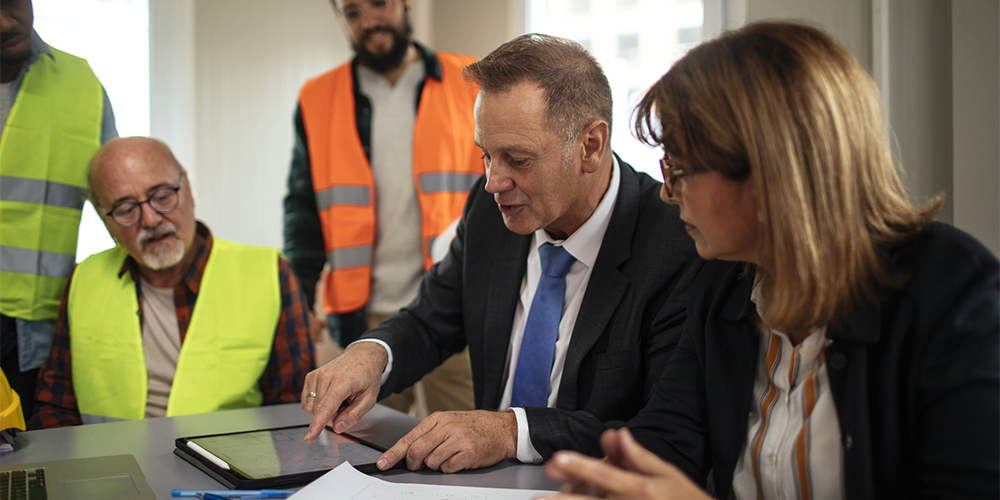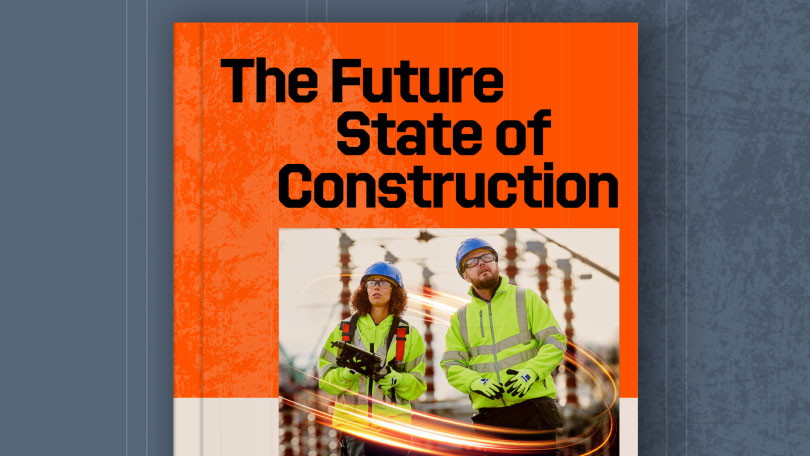— 5 min read
Understanding the Role of a Main Contractor in the UK: The Backbone of Construction

Last Updated Aug 28, 2025

Mike Smith
Strategic Product Consultant
Mike Smith is a Strategic Product Consultant at Procore, where he helps construction teams streamline processes and achieve project success through technology. With a career in construction spanning over 15 years, Mike has held key roles such as Project Manager, Scheduler, Project Controls Manager, and Field Engineer. His experience spans commercial fit-outs, residential projects, and industrial developments, giving him a well-rounded understanding of the industry's complexities. Originally from Florida, Mike has been based in Australia for the past nine years, bringing his expertise to a wide range of construction projects.

Nicholas Dunbar
Content Manager
65 articles
Nick Dunbar oversees the creation and management of UK and Ireland educational content at Procore. Previously, he worked as a sustainability writer at the Building Research Establishment and served as a sustainability consultant within the built environment sector. Nick holds degrees in industrial sustainability and environmental sciences and lives in Camden, London.
Last Updated Aug 28, 2025

Behind every successful construction project is a main contractor (MC) who orchestrates dozens of moving parts to deliver a project on time and within budget. On the flip side, poor management by an MC often results in blown budgets, disorganised workflows and poor-quality work. Let’s take a closer look at how the MC role is invaluable to UK construction.
Table of contents
What Is a Main Contractor?
A main contractor is the commercial entity a client or project owner appoints to construct a project from inception to completion. They ensure the works are built to the design, within the agreed programme and in line with UK regulations - working closely with the client, design teams, engineers, consultants and trade contractors.
If you’ve ever searched “what is a general contractor”, most results refer to the American context. In the UK, the equivalent and widely used term is main or principal contractor.
Types of Construction Projects: Residential, Commercial & Industrial
Main contractors in the UK work across different sectors, each with its own characteristics and complexities:
Residential
Projects related to housing - new builds, extensions and apartment blocks. MCs manage trades such as carpentry, electrics, plumbing, tiling and decorating.
Commercial
Construction of buildings used for business purposes, e.g. offices, retail parks, hotels and restaurants. MCs often oversee trades specialising in fire services, acoustics and heritage conservation.
Industrial
Large-scale schemes tied to manufacturing, logistics and energy, including factories, warehouses and power plants. MCs on these projects may co-ordinate hundreds of workers across multiple subcontract packages.
Occasionally the MC has in-house design and trade capability. Clients may appoint this type of contractor on a Design & Build basis for a single point of responsibility, rather than the traditional Design-Bid-Build route where design and construction are procured separately.
While scale and scope vary, the core responsibilities of an MC remain consistent: managing trade contractors, overseeing timelines and budgets, ensuring quality control and acting as the key liaison between the client and everyone else on the project.
Main Contractor Licensing & Competency Requirements
Unlike other countries, such as Australia’s state-by-state builder licences, UK MCs must demonstrate organisational capability under the Construction (Design and Management) Regulations 2015 (CDM). Individual trades hold their own CSCS cards or specific trade accreditations, while the MC is typically appointed as the principal contractor. HMRC also requires MCs that pay subcontractors to register for the Construction Industry Scheme (CIS).
What Does a Main Contractor Do?
Tendering
Main contractors are central to the construction tendering process. Competing with other firms, they analyse drawings, construction estimating and build a realistic programme by engaging trade contractors and suppliers. Striking the right balance between time, cost and quality is crucial to winning work and still delivering profitably.
Pre-construction
Once awarded the job, the MC is responsible for:
- Forecasting lead times, highlighting any reduce construction risks such as long procurement periods for façades or MEP plant.
- Engaging trade contractors to deliver work packages.
- Working with the building construction teams to ensure buildability and compliance with British Standards.
Pro Tip
To keep a project on time and within budget, an MC must proactively manage risks from day one - flagging anything that could compromise programme, cost or quality.
During Construction
Without effective management, projects bust budgets and slip schedules. During the build, the MC must:
- Ensure work is built to the latest drawings and specifications.
- Deliver the project on programme.
- Identify risks early and problem-solve.
- Communicate status to clients, consultants and trade contractors.
- Schedule inspections to meet UK Building Regulations and HSE standards.
- Pay trades on time via the CIS payment chain.
Post-construction
As the project nears completion, the MC focuses on smooth handover:
- Managing final payment applications and retention.
- Co-ordinating the client walk-through and closing defects.
- Compiling O&M manuals, warranty certificates and Building Control sign-off.
How Payments Work for Main Contractors
Owners often rely on bank finance, releasing monthly valuations to the MC against certified progress. This cash flow lets the MC pay trade contractors and keeps the project moving, avoiding additional financial management challenges.
How Leading MCs Use Technology
There are many moving parts to a project, so it’s crucial to have complete visibility and clear communication. Leading MCs use centralised platforms such as Procore to:
1. Enhanced Scheduling & Timeline Management
Integrate tools like Microsoft Project with project software - or dedicated construction scheduling solutions - to connect programme data with cost, resources and comms, proactively managing workflows.
2. Streamlined Financial Management
Integrating accounting packages with project platforms gives one source of truth, enabling live cost dashboards and timely payments.
3. Improved Collaboration & Communication
A central hub for document sharing and real-time updates improves transparency and reduces delays.
4. Increased Efficiency & Accuracy
Automation frees teams from manual tasks, while reducing human error in estimates, schedules and budgets.
5. Data-Driven Insights
Analytics highlight trends and risks, enabling MCs to mitigate risk, drive efficiency and make data-driven decisions.
UK Regulations & Compliance
Main contractors must:
- Register under the Construction Industry Scheme (CIS) when paying subcontractors.
- Fulfil the duties of principal contractor under CDM 2015.
- Achieve Building Control approval, including energy performance to Part L standards via UK Building Regulations.
- Adhere to the Health and Safety at Work etc. Act 1974 and guidance from the Health and Safety Executive (HSE).
Failure to comply can result in fines, project delays or even criminal liability.
Main Contractor vs Building Contractor
While a building contractor usually self-delivers specific trades, a main contractor co-ordinates multiple building contractors and consultants, shouldering overall programme, cost and H&S responsibility as principal contractor.
The Evolving Role of Main Contractors in Modern Construction
As the industry evolves, MCs face new opportunities and challenges. By embracing technology, sustainable practices and modern construction methods, they will continue to be the backbone of successful projects.
Frequently Asked Questions
Q: What is a main contractor in construction?
A: The main contractor (or in the US and Australia, the ‘general contractor’) is the principal contractor overseeing every phase - design integration, procurement, construction and handover.
Q: How does a main contractor make money?
A: Typically through a combination of preliminaries, overhead and profit margins, plus potential savings-share on cost-plus or target-cost contracts.
Q: Do main contractors carry design risk?
A: On Design & Build projects, yes - they assume design responsibility and associated risk; on traditional contracts the design team retains most design liability.
Q: Are MCs responsible for health & safety?
A: Yes. As principal contractor under CDM 2015, the MC plans, manages and monitors construction phase H&S.
Categories:
Written by

Mike Smith
Strategic Product Consultant | Procore
Mike Smith is a Strategic Product Consultant at Procore, where he helps construction teams streamline processes and achieve project success through technology. With a career in construction spanning over 15 years, Mike has held key roles such as Project Manager, Scheduler, Project Controls Manager, and Field Engineer. His experience spans commercial fit-outs, residential projects, and industrial developments, giving him a well-rounded understanding of the industry's complexities. Originally from Florida, Mike has been based in Australia for the past nine years, bringing his expertise to a wide range of construction projects.
View profileReviewed by

Nicholas Dunbar
Content Manager | Procore
65 articles
Nick Dunbar oversees the creation and management of UK and Ireland educational content at Procore. Previously, he worked as a sustainability writer at the Building Research Establishment and served as a sustainability consultant within the built environment sector. Nick holds degrees in industrial sustainability and environmental sciences and lives in Camden, London.
View profileExplore more helpful resources

Integrated Compliance: A Main Contractor’s Guide to ISO 9001, 14001, 45001, and 44001
For UK main contractors, ISO 9001, 14001, and 45001 are fundamental prerequisites to any tendering activity. The Building Safety Act, Net Zero targets, and tight margins mean these certifications are...

The Main Contractor’s Action Plan for Commercial Risk
For UK main contractors, managing risk protects project margins, rather than solely acting as a compliance exercise. Construction is an industry defined by thin profits and high liability, and a...

Construction Action Plans: Minimising Risk & Maximising Delivery
A construction project is a complex set of tasks, resources, and stakeholders. Without a clear, documented path forward, even meticulous planning can lead to delays, cost overruns, and disputes. The...

Construction Drawings: Guide to Types & Regulations
While architects, urban planners and landscape designers first conceive buildings and public realms in their minds, translating vision into detailed drawings remains the foundation for any project. Construction drawings translate...
